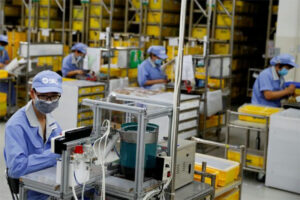THE PHILIPPINES will need to lay the groundwork for receiving manufacturers exiting China by ensuring that the relocators have adequate supplier networks here, a retail industry official said.
Philippine Retailers Association President Roberto S. Claudio on Tuesday said that the tariffs imposed by US President Donald J. Trump will result in a shift in the production.
“I think the Philippines should be in a good position to take advantage of this mess or the confusion going,” he said on the Money Talks with Cathy Yang program on One News.
He said businesses should take advantage of movement out of China by improving supply and raw material availability.
He said the availability of steel, leather and textiles will be key to attracting manufacturing relocators.
“Some Chinese companies are starting to look at the Philippines and other Asian countries,” he added.
“For retailers, there’s another positive effect… because some goods from China destined for the US (may not end up being shipped there),” he said.
“Asia will be flooded with Chinese products that used to go to the US… the Philippines in particular can take advantage of all these products coming in,” he added.
Separately, the Philippine Chamber of Commerce and Industry (PCCI) said the 17% tariff imposed on the Philippines will ensure continued competitiveness for Philippine goods, though it is wary of the potential impact on some product categories.
“The US has yet to announce the exact coverage, but we remain vigilant as such tariffs typically target specific categories of goods such as food and agri products and electronics, which are our major exports,” the PCCI said in a statement on Tuesday.
The PCCI cited the risk, however, of actions taken by other countries in response to the US tariffs.
“Retaliatory measures can disrupt global supply chains, increase costs, and create uncertainty for businesses and consumers, bringing about a broad negative effect on economic growth. And more so for a remittance- and consumer-driven economy like ours,” it said.
“The ripple effect of having to absorb extra costs will be hardest on small businesses, particularly those in agriculture and food processing. We note, too, that our neighbors are already preparing to negotiate with the US to offer lower tariffs and better concession arrangements,” it added.
The Department of Trade and Industry on Monday said that it is open to lowering tariffs on US goods in response to the reciprocal tariff.
Trade Secretary Ma. Cristina A. Roque has yet to meet with her US counterparts.
PCCI Chairman George T. Barcelon said that the Philippines should consider lowering tariffs in consultation with the private sector. — Justine Irish D. Tabile
